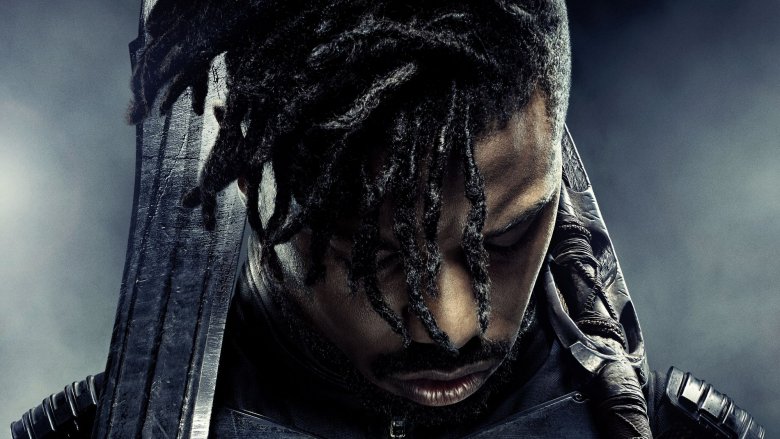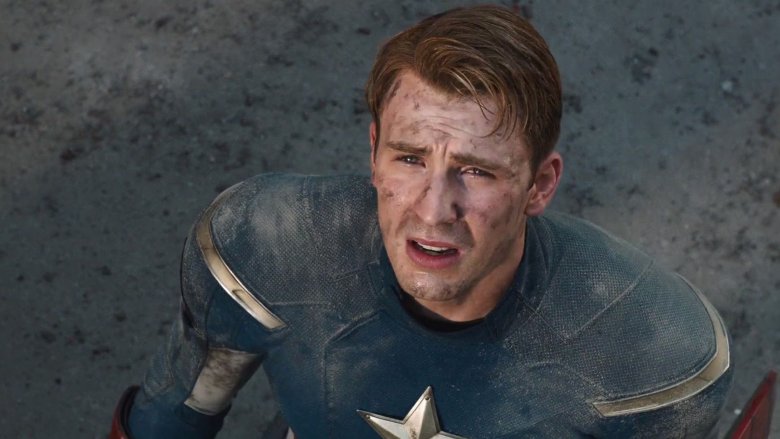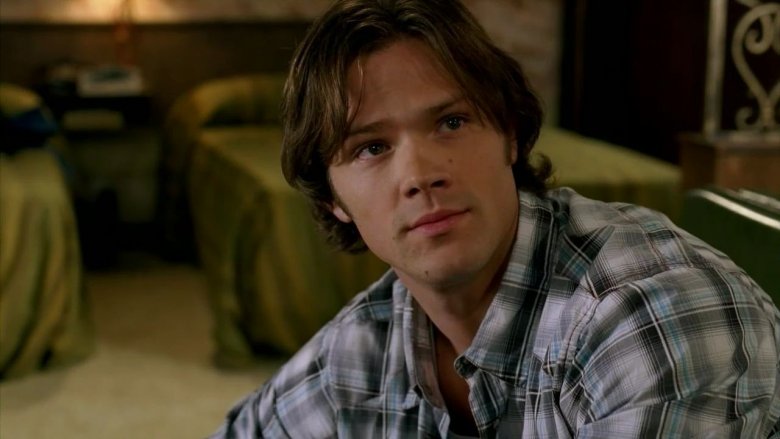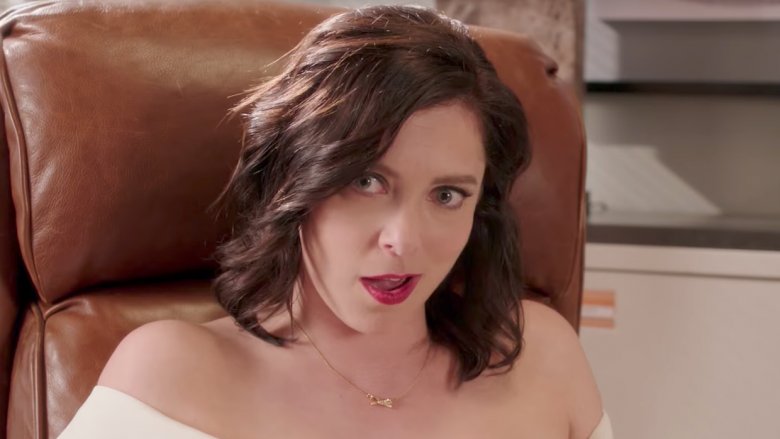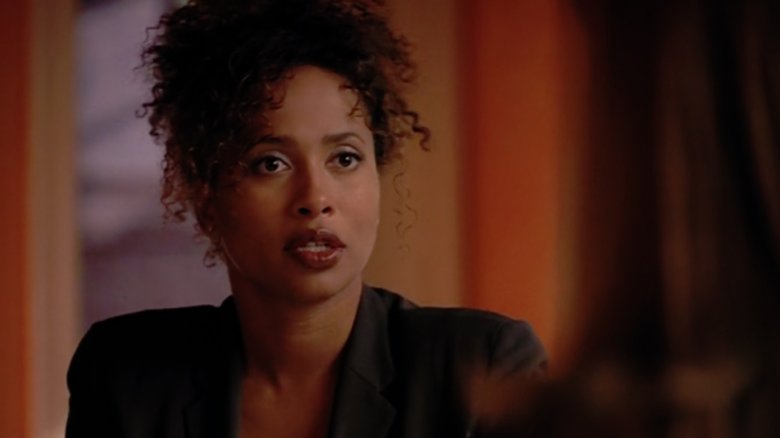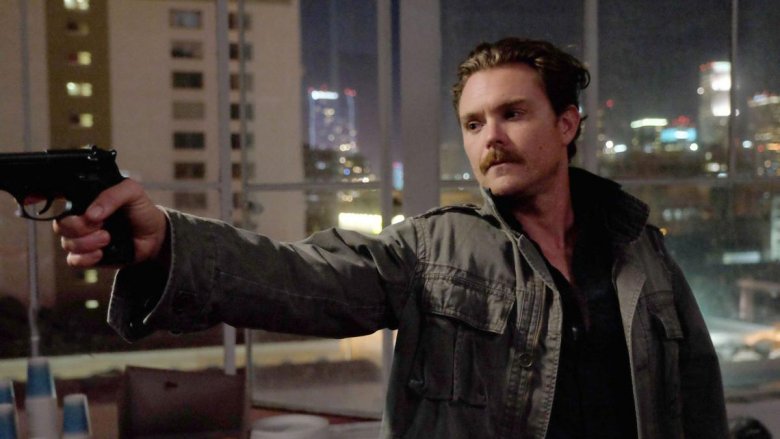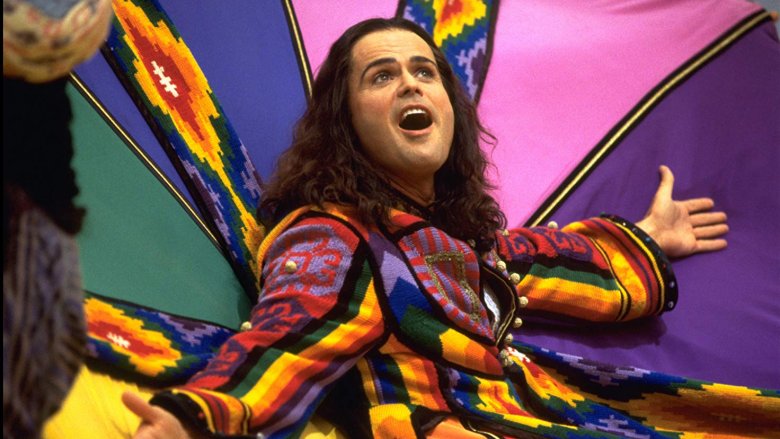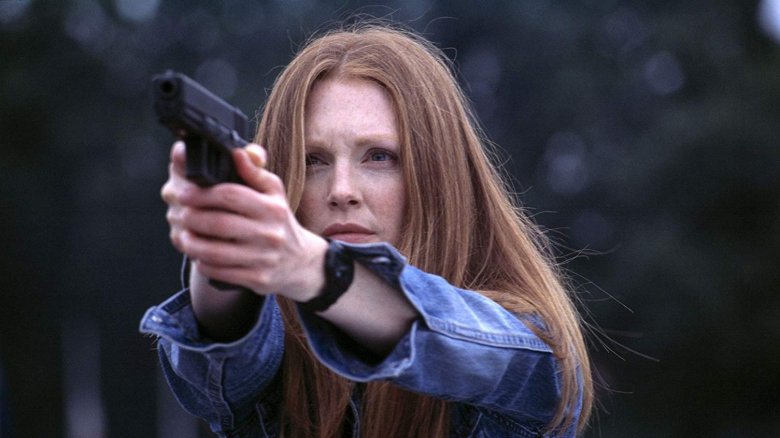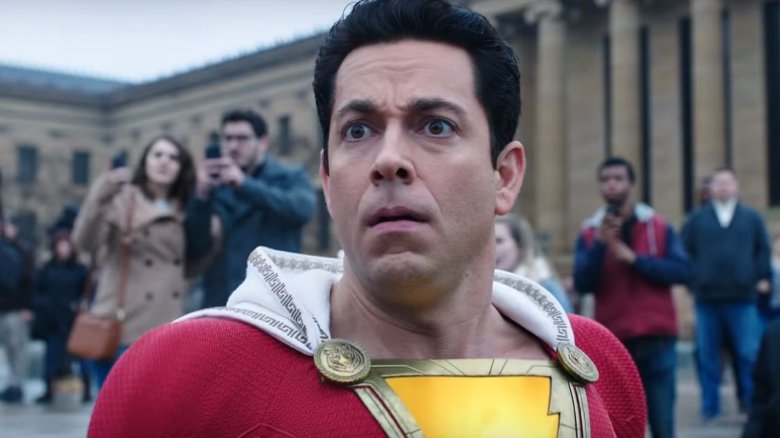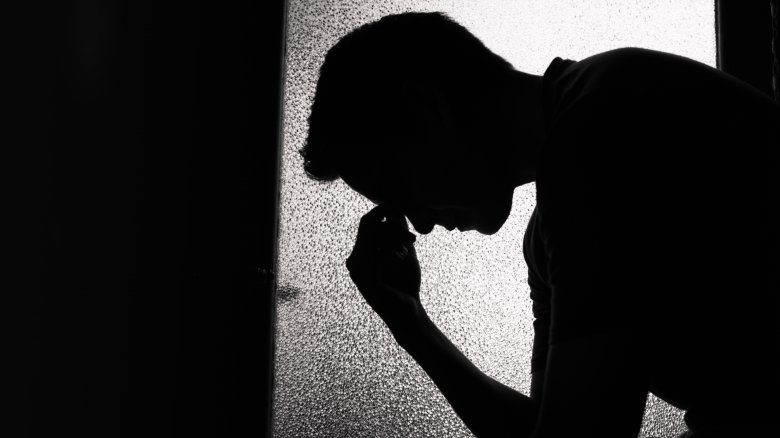Terrifying Moments That Forced Actors Into Therapy
It's hard sometimes to have sympathy for the difficulties faced by those living a glamorous Hollywood existence. The opulent homes and extravagant red-carpet lifestyles of the stars can make it seem impossible to imagine that they really struggle like the rest of us do. At the end of the day, though, acting is a job. It's a job that requires long hours and, depending on the role, can be both physically challenging and mentally strenuous. Actors often take on parts that require a deep level of emotional and physical commitment. The pursuit of Hollywood success has led many a performer to experience a crisis serious enough that they required professional help to preserve and strengthen their mental health.
More and more, actors are opening up about how therapy allowed them to handle some terrifying moments in their careers. We spoke to Robin Halpern, LCSW, DCSW and Hank Blumfarb, LCSW, two psychotherapists from the Psychotherapy and Training Collective of New York, about the challenges some actors face in bringing their memorable characters to life, and how therapy can be a useful tool to help confront their issues. It turns out that stars really are just like us when it comes to how mental health treatment can make a difference in their personal lives.
Content warning: this article contains mentions of anxiety, depression, self-harm, and suicide.
I was feeling so sad
Michael B. Jordan's performance as the villainous Erik "Killmonger" Stevens in the 2018 blockbuster Black Panther was so arresting, some critics felt it overshadowed Chadwick Boseman's lead role as King T'Challa of Wakanda, the titular Black Panther. Jordan dove deep to portray Killmonger, T'Challa's long-lost cousin, and it seems his star turn as the charismatic anti-hero came at a price. Jordan explained in an interview with Bill Simmons, "I never was in a character for that long of a period of time" who "was that dark, that lonely, that painful." The actor found it hard to let those feelings go. "Once I got finished wrapping the movie, it took me some time to talk through how I was feeling," he told Simmons, " and why I was feeling so sad, and like a little bit depressed."
Psychotherapist Robin Halpern is familiar with this phenomenon. "Some actors become re-traumatized by the roles that they are attempting to dramatize," she explains. "It is essential for the actor to be able to both merge with the character and then re-emerge." Halpern noted that an actor's inability to accomplish this may be linked to "their extreme sensitivity to whatever deep-rooted feeling is being evoked" by their performance.
Indeed, Jordan later told Oprah Winfrey that he felt Killmonger was an "exaggerated version of the African diaspora from the African-American perspective," and that drawing on the "pain and rage" of being "black and brown here in America" was something he "didn't take lightly." When Jordan realized he was still carrying Killmonger's pain and isolation into his personal life, he sought out professional help. "Honestly, therapy, just talking to somebody just helped me out a lot," he said. He also acknowledged the cultural stigma that men in particular face about mental health treatment. "I don't really subscribe to that," he said. "Everyone needs to unpack and talk."
I do struggle.
It's hard to imagine anyone other than Chris Evans donning the blue helmet and hoisting a vibranium shield as Captain America, but we came very close to seeing a different person as Steve Rogers. "I do struggle," Evans admitted in a video for the Motivation Madness channel on YouTube. "I get anxiety about certain things and press, things like that." That anxiety was so intense, it actually led him to initially turn down the role of Captain America. "It was a big commitment, they wanted six movies," Evans explained. Instead of embracing a deal that is surely the dream of most working actors, Evans was obsessively focused on his fears. Afraid of losing his anonymity and being unable to cope with the demands of fame amidst a role that would span ten years of his life, Evans turned to therapy for support.
"I asked every human being in my life what they thought, and they said I should do the movie, and then I went to therapy. I thought, 'I'll talk to my therapist! See what they have to say!'" Psychotherapist Hank Blumfarb notes that when dealing with this kind of career anxiety, "It's important to be able to self-regulate [an anxious response] and different people are better at this in some areas, and not as successful in others."
Sure enough, after working through his anxiety with a professional, Evans was able to come to a realization. "Maybe the thing you're most scared of is exactly the thing you should do," he told himself. Evans is thankful that therapy enabled him to take on the role that made him famous, but he's also grateful that his fear pushed him to seek help. He called his therapy sessions "a great catalyst," explaining, "Had I not done the movie I don't think that I would've gone to therapy."
I could no longer, on my own, muster the will to carry on.
Jared Padalecki has spent well over a decade hunting angels, demons, and too many other paranormal entities to list as Sam Winchester in Supernatural, the longest-running sci-fi show on American television. However, none of those fictional battles — or the fame that came with them — prepared him to face depression. While shooting a Christmas episode for the show's third season, Padalecki was overcome by a depressive episode so serious he found himself unable to move. In the 2017 book Family Don't End with Blood: Cast and Fans on How Supernatural Has Changed Lives, he explained, "I walked into my trailer, sat down on the couch, and I couldn't get up. I could no longer, on my own, muster the will to carry on." Costar Jensen Ackles took one look at Padalecki and knew his TV brother "was not okay." Ackels called the on-set doctor, who diagnosed Padalecki with clinical depression.
Instead of seeking treatment, Padalecki only took a few days off from filming, concerned that any longer breaks would negatively effect the livelihoods of the show's crew. "I also couldn't face, or admit, what was going on in my head," he confessed. It took until just before the start of Supernatural's 11th season for him to break down. During a stopover in Geneva on his way to some convention appearances, he found himself sobbing uncontrollably in a public park, so deeply depressed that he later reflected, "I knew I wouldn't get out of Switzerland alive." A timely phone call from a friend convinced Padalecki to make it home to his family, where he finally was able to take a break and, as he put it, "take care of me and my emotional and mental health."
"Mental health and well-being are still very much taboo (unfortunately)," the actor wrote in Family Don't End with Blood, "so people can be embarrassed or ashamed to admit they could use some help." Reasoning that if he wanted to get in peak physical shape he'd employ a personal trainer, he knew he needed to talk with "friends, family, and professionals" to get in peak mental shape. He's carried those lessons forward, starting the "Always Keep Fighting" campaign to raise funds for "To Write Love On Her Arms," a charity that aims to give help to people struggling with depression, addiction, self-injury, and suicide.
In his office I finally felt safe.
Crazy Ex-Girlfriend has broken barriers in its depiction of mental health issues, showing compassion for the difficulties of its central character as she grapples with the negative behaviors associated with her eventual diagnosis of borderline personality disorder. That tone is something that Rachel Bloom, co-creator and star of the series, prioritized along with her co-creator, The Devil Wears Prada author Aline Brosh McKenna. The main objective, as Brosh McKenna put it, "was to make sure that we were being as kind as possible — to Rebecca and about the situation."
In the kind of synchronicity that you'd expect from a scripted series, it was the process of pitching Crazy Ex-Girlfriend that led Bloom to be kinder to herself and seek out a psychiatrist for the first time. In an interview with Access Hollywood, Bloom said, "Right around the time we were pitching Crazy Ex-Girlfriend, I got real bad sleep anxiety." This period of insomnia "started a spiral" where Bloom said she became delirious, afraid that because she wasn't sleeping, she "would ruin everything."
Halpern explains that "experiencing constant rejections can also be the cause for the downward spiral that many actors experience." She advises that "before deciding to give up the pursuit of their passion," stars can seek psychotherapy in hopes of better understanding the emotions that are being triggered for them.
Indeed, Bloom's work with her psychiatrist was transformative. "In his office I finally felt safe," she said. "I told him everything. Each session improved my life." Bloom was candid about her fears regarding medication on Twitter, where she interacts with her fans regularly. "Before I went on antidepressants, I too bought into the idea of them being shameful or a cop out," she tweeted. "I was wrong."
You can think you're fine, and you're not fine.
In the '90s, Lisa Nicole Carson was riding high. She was simultaneously starring in ER and Ally McBeal, putting her front and center in two of the most beloved television hits of that decade. "I've always been full of energy and would often be twirling around on sets," Carson remembered in a personal essay for Essence in 2015, "but my high-spirited moments looked like something else to one of the producers on ER." One of those producers eventually told her he thought she had bipolar disorder. "I didn't feel like I was sick. You can think you're fine, and you're not fine."
Carson ignored the producer's warning until she had "a fit" in her hotel. "Yelling, throwing things, crying and raising enough hell that the staff called an ambulance," she wrote in Essence. "I ended up being hospitalized for a few weeks, and a psychiatrist gave a diagnosis: bipolar disorder." She was prescribed medication to stabilize her moods, and worked with a therapist before being discharged to return to work. Carson revealed that even though "everybody on the show was wonderful" to her following the highly-publicized breakdown, her contract for Ally McBeal wasn't renewed for the show's final season. "I was devastated," she said.
Ally McBeal castmate Calista Flockhart supported Carson speaking out. "I think she is brave for telling her story, but then again I always thought she was brave about everything," she told People Magazine. While it's pretty ironic that a series which addressed mental health within its narrative also fired a lead actor for those same behaviors, Carson has moved on with her life. "I'm tackling the myth that African-American women have to be pillars of strength. We have the right to fall... I now am stronger and ready for what's next, while taking care of my emotional health."
I apologized for my part of the conflict.
Anger management can be a real problem when actors find themselves in a stressful situation. It certainly was for Clayne Crawford, who starred as Detective Riggs opposite Damon Wayans as Detective Murtaugh in the television series Lethal Weapon, a reboot of the film franchise of the same name. Crawford spent two seasons in the role that originally helped secure Mel Gibson's career, and earned rave reviews for his performance as the troubled detective. By the end of the second season, however, Deadline reported that the future of the series was in jeopardy due to Crawford's behavior, claiming the actor had "been disciplined several times over complaints of emotional abuse and creating a hostile environment."
Crawford responded in a lengthy post on his Instagram account, stating he was disciplined over his reaction to "working conditions that did not feel safe or conducive to good work." Reports had indicated that Crawford was yelling at children on set to be quiet as they were holding up production. He claimed this was "a blatant lie" and that he was actually confronting the first Assistant Director. "I met with Human Resources, I apologized for my part of the conflict, and I completed studio-appointed therapy," he explained. "I even shared a sizable portion of my paycheck with one of the parties involved per the instruction of the studio."
"I had to spend six weeks in anger management every day on my lunch break and had to be escorted from my trailer on set by a security guard. It was humiliating," Crawford revealed. Unfortunately, it wasn't enough to salvage things. Tensions between Crawford and Wayans later reached a boiling point following an on-set accident. During an episode Crawford was directing, Wayans sustained a minor injury, and a video was later released of Crawford insulting Wayans following the incident. Crawford was fired, and his character was killed off at the start of the show's third season.
It wasn't a very good time in my life.
When Kit Harrington won the part of Jon Snow on Game of Thrones in 2010, he couldn't have known the scrutiny it would bring to his life. A relative unknown with only a few — albeit impressive — theater credits, Harrington was thrust into the spotlight. As Jon Snow found himself at the center of the battle to rule over the fictional kingdom of Westeros, pressure mounted on the young actor. When Harrington broke his foot after a night of drinking before the start of season three, John Bradley, who plays Snow's friend Samwell, told Rolling Stone that Harrington, who "takes it all very seriously," was feeling "low about letting people down."
In 2017, Harrington discussed his character's death and resurrection with the New York Times. The interviewer noted that it seemed Jon Snow hadn't yet come to terms with the strange situation. Harrington replied, "We know that psychotherapy is a very good thing, where we can go very in depth about what makes us 'us,' and resolve our problems, but that's not Jon. Jon doesn't talk at the best of times!" This comment foreshadowed Harrington's later admission to Variety that he was actually in therapy at that time.
"It wasn't a very good time in my life," Harrington said of the period following Jon's rebirth. "I felt I had to feel that I was the most fortunate person in the world, when actually, I felt very vulnerable... that was a time when I started therapy."
It's a situation Blumfarb has seen in patients before. He notes that depression can be "activated when there is a conscious or unconscious gap between the wished for self and the actual self at the present time. This can occur both in their skill as an actor and in their ability to manage the logistics and business of the acting world." This was certainly true for Harrington, who said, "I felt incredibly concerned about whether I could even f***ing act." Harrington knew he had to talk through his feelings with a professional. "I had felt very unsafe," he said, "and I wasn't talking to anyone."
I just couldn't get out of bed.
Child star. Teen idol. Talk show host. Peacock. Donny Osmond has been all these things and many more in a career that has spanned over five decades. His version of the song "Puppy Love" topped the Billboard music charts in 1972, and he'd be back at the top again with "Soldier of Love" in 1989. In 2008, he began an 11-year residency in Las Vegas, performing with his sister Marie Osmond. In 2019, he found himself in the spotlight in a new way, as the runner-up finalist in the Masked Singer competition. "This is a whole different dynamic in this business," he said of the series, in which he was disguised in a full-body costume to compete against other masked celebrity singers.
It wasn't the first time Osmond had donned a colorful costume to sing his heart out. In 1999, he starred in a film adaption of Joseph and the Amazing Technicolor Dreamcoat. The role came during a difficult point in his life, when the pressure to deliver the kind of performance that would cement his adult career was fierce. "Now the pressure was even greater to be perfect," he said in a 2000 interview with 48 Hours. "I thought I was actually going crazy in my mind. I remember shaking in bed, and I just couldn't get out of bed. Something was wrong, and my wife took me to the hospital."
The film's producers brought in a therapist to work with the star, who was suffering from social anxiety disorder, "a condition that causes an irrational fear of social or performance situations," according to 48 Hours. His therapist taught him to "play with the fear, instead of running from it." Osmond's work in therapy helped him to cope with the fear he still fights against today. He now knows that even if he doesn't give his best performance, "it's OK; you pick up and just move on."
I actually talked to my shrink about it.
"Some are able to 'split off' and separate themselves from the role that they are playing, while others' particular sensitivity doesn't allow them to do so," Halpern says of actors who have difficulty playing parts that require them to contemplate the darker, more violent side of human nature. Julianne Moore expressed similar sentiments in an interview with Vanity Fair about her role as Clarice Starling in the 2001 film Hannibal. Starling faces off against one of cinema's most famous serial killers in Hannibal, a sequel to the 1991 thriller The Silence of the Lambs. Following in the footsteps of Jodie Foster's acclaimed and career-defining performance as Clarice would be daunting for anyone, but that wasn't what worried Moore most about taking on the part. "I actually talked to my shrink about it," Moore said, explaining that she struggled with the violent material "as a parent, as a person," adding that "Hannibal is the dark side that is part of everyone."
Halpern contends that the problems performers face in separating themselves from their characters can lead them to feel that darkness "on a personal level." Moore explained how her work in therapy helped her to contextualize things. "My apprehensions had to do with the nature of the violence. I am pretty careful about violence," she said. "We are socialized, civilized, but in our fantasy lives we explore those [dark] themes. That's okay. This is a film about good and evil coming up against each other. It's iconic and almost mythologized. But it is psychologically horrifying."
I felt very beat up by Hollywood.
In 2013, Marvel Studios announced that Chris Pratt would star in Guardians of the Galaxy. The deal made a leading man out of Pratt, but triggered a period of depression that would ultimately threaten the life of actor (and Star-Lord runner-up) Zachary Levi. The eventual star of 2019's Shazam! recalled to Men's Journal how losing the role to Pratt was "part of what drove me into darkness. My unhealthy take on what that meant to my own worth." Levi had struggled with self-esteem since childhood. "My mom was a beautiful, vibrant, intelligent, incredible woman who was also very tortured and psychologically abused her whole life," he told the hosts of The View, "and therefore my sisters and I got the brunt of that."
Levi continued to pursue his career, but his mental health suffered. In 2016, he flew to Australia to reprise his role as Fandral in Thor: Ragnarok, only to see most of his work end up on the cutting room floor. It didn't help that around same time, his brief marriage imploded and his mother died. "I felt very beat up by Hollywood," Levi told Men's Journal. "I was at a place in my life where I didn't really understand why I wanted to live anymore."
Halpern explains that a "ubiquitous experience for actors is the constant rejection they have to endure in the audition process. If someone has deep-rooted issues around rejection, this is going to be particularly painful." It certainly was painful for Levi, but instead of giving in to the depression, he reached out for help. Levi sent himself to a three-week mental health retreat in Connecticut, and it was there he received word he'd been called back for Shazam!. He filmed his audition on his phone from the retreat, where he saw a psychotherapist and a dialectical behavioral therapist in addition to learning meditation techniques. The therapy "saved my life," said Levi, who was being fitted for his Shazam costume a week after completing the program.
If you need to talk
The issues discussed in this piece relate to famous faces, but you might recognize some familiar feelings in how these celebrities describe their battles with anxiety, depression, and thoughts of self-harm. Halpern hopes that those who are experiencing difficulty will consider seeking psychotherapy. "Therapy can help with this and it can be accomplished via various approaches," she says. She also cautions that there are "popular notions about how long the therapeutic process can take in order for one to both feel better, and to gain a deeper understanding of who they really are and what makes them tick." She adds that "the therapy process is very personal to each individual and there isn't any 'normal' amount of time that it will take for someone to feel better."
For those celebrities who made the personal decision to ask for help, their positive outcomes prove that it was time well spent. According to the National Institute of Mental Health, "research shows that mental illnesses are common in the United States, affecting tens of millions of people each year. Estimates suggest that only half of people with mental illnesses receive treatment." It's a trend that can, and should, be changed.
If you or someone you know is struggling with mental health, free and low-cost help is available. The Suicide Prevention Lifeline can be reached 24/7 at 1-800-273-8255. The National Alliance on Mental Health also has a helpline that offers free help 24/7 — text NAMI to 741741. A list of international crisis hotline numbers is here. To find centers that treat a variety of mental health issues in the United States, you can use this behavioral health services locator.
